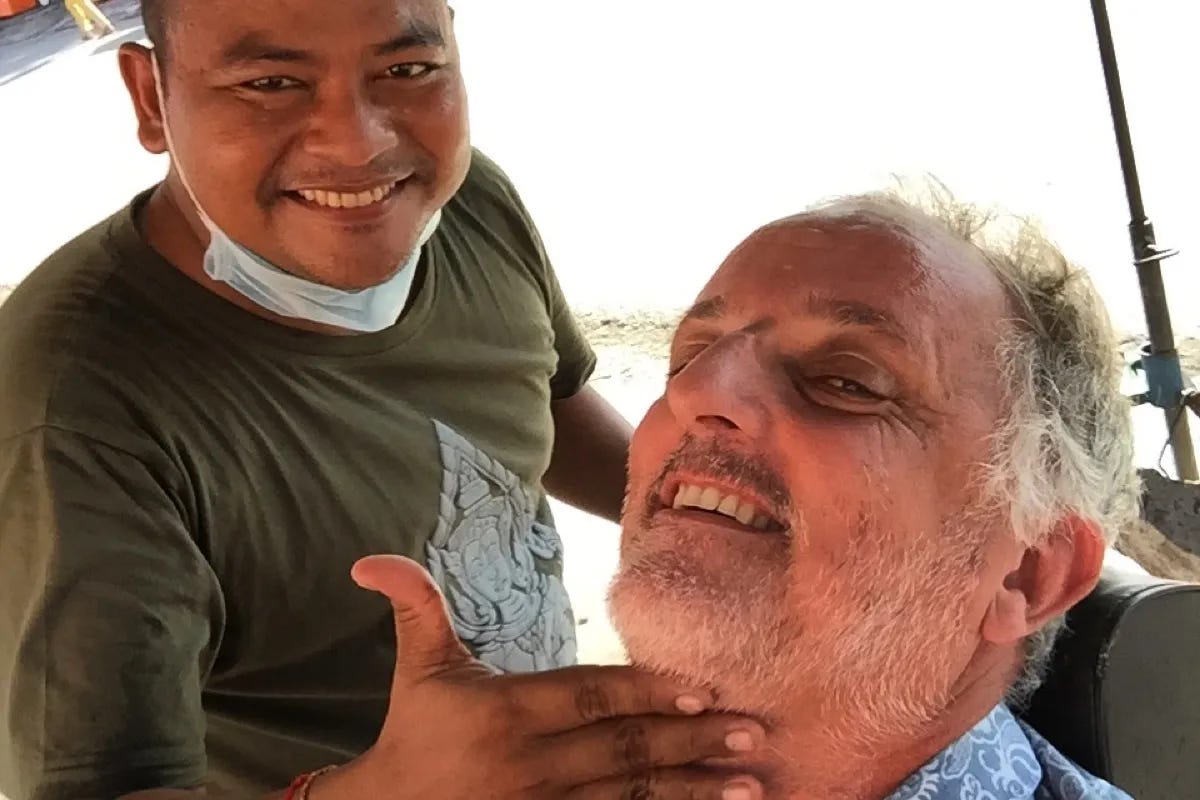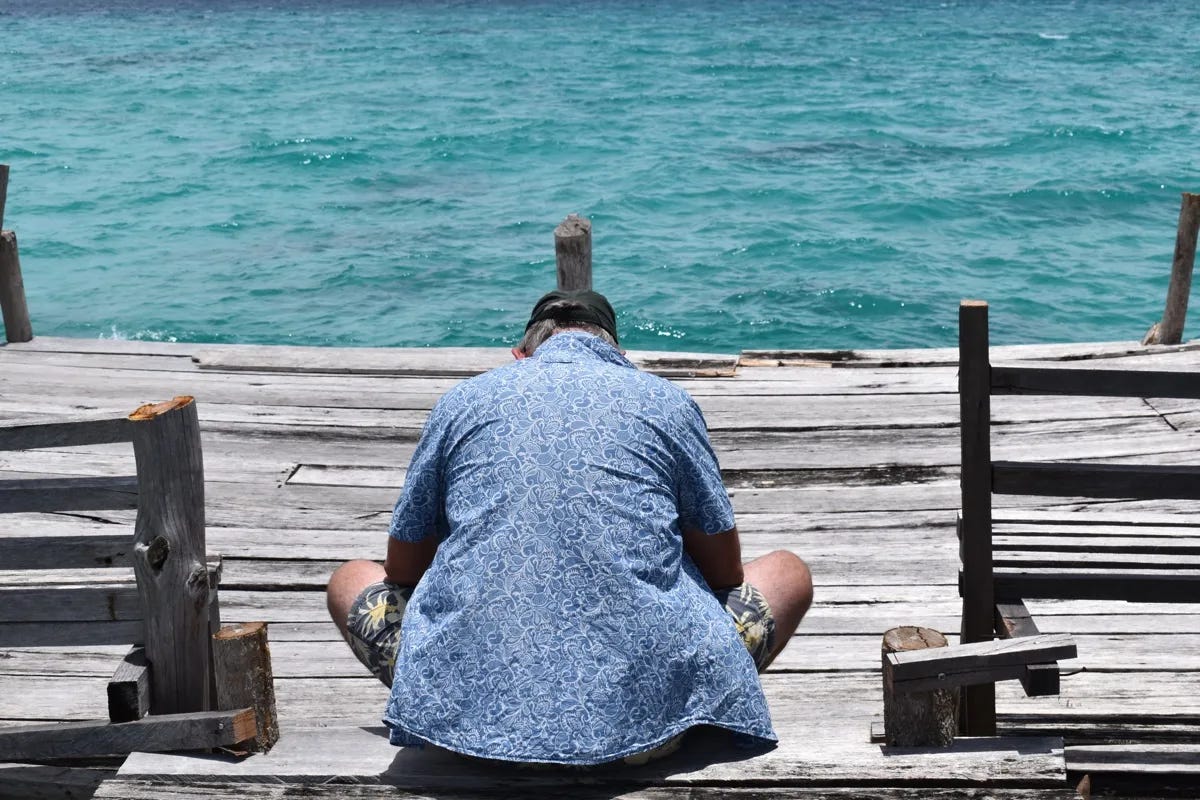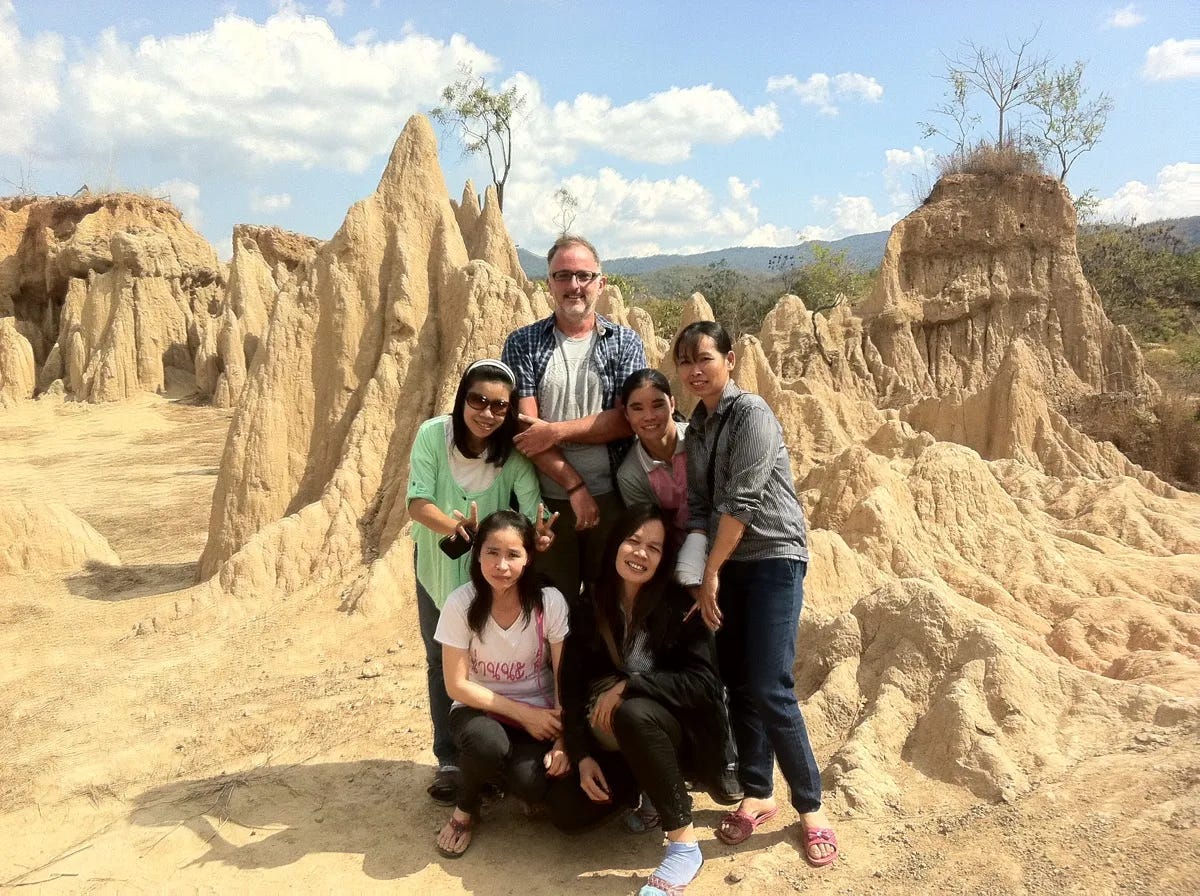Big Fish
Meet Stuart McDonald, founder and owner of Travelfish, which for the last 18 years has been guiding travelers (and travel writers) to places unknown in Southeast Asia
His name might not be the most familiar, but if you run in Southeast Asian travel circles you'll undoubtedly know who Stuart McDonald is. And if you still don't, then explaining that he's the man behind guide website Travelfish should set you straight. Based in Bali alongside his wife and co-founder Samantha Brown, he's been sending travellers to places lesser known since 2004, providing truly original content via his own writings and a team of locally-based freelancers - with a strict no-freebie policy.
So Stuart, you've probably told this story many times, but how did Travelfish come about?
In a way accidentally. There was no grand plan so to speak, rather a bit of “right time right place” and all that. I’d authored a couple of guidebooks a few years earlier (covering Vietnam and Thailand), and after a spell working at an embassy in Thailand, I’d taught myself the basics of building a website. By the early 2000s travel in Southeast Asia was really ramping up, TripAdvisor was well patchy on the places we loved, I knew how to build a website and how to research a travel guide, and so, well, my partner Samantha and I got to work on it.
Did you have a vision for what it would become? And how closely does it now match that?
No. It started off covering just our favourite places in Thailand, and looking back there was a fair degree of banana pancake trail in our choice of destinations! There was no business plan and we really had no idea what we were doing. It would be a few years before we made any money out of it, but once we realised we could, I started working a bit harder on expanding the site—and travelling a lot more. In the years since, we tried all the common monetisation methods for a content site—ads, hotel affiliates, selling travel guides and so on—but in the years preceding the pandemic, as I grew increasingly dark on advertising, we moved to a membership model, and that remains the mainstay of the business.
Before the site, you worked on print guidebooks, how did you get into that line of work?
I self-published the two with an Australian friend and with a couple of others helping us out with the research. I’d arrived in Vietnam in 1994 and thought the guidebook I was using wasn’t very good, so decided to write my own. Again, as with Travelfish, I started out not having any idea what I was doing, but I sure learned a lot about how the sausage factory worked over this period.
I've worked on a few guidebooks recently, but do you think there's still a place for them?
Yes, definitely. If I was going to a country I’d never been to tomorrow, the first thing I’d buy would be a guidebook. The meat of the guide, sure that ages fast, but the front and back of the book—the cultural, historical, societal information and so on, well, that dates far slower and is essential if you want to have any understanding of the country you are in.
I love the name 'travel fish', but how did you come up with it? What were the alternatives?
We just made it up in our apartment in Bangkok. The site had had a false start a year earlier, and at the time we had a working name of Four Elephants (representing the four countries we planned to cover). I got distracted by something else and the idea languished for a year, during that time Sam used fourelephants for something else, so we had to come up with another name. Travelfish has “travel” in it, fish swim everywhere, and it is easy to remember. It stuck.
Your tagline is 'Travelfish - the website other travel writers use', and I could personally vouch for that. But apart from no freebies, what makes you different from other guides?
Thanks. The no freebies thing is the big one. Very few publishers work on the same basis as we do in this regard, particularly as we don’t accept media rates either. Other differences I guess would be that we visit everywhere we write about—others may claim that, but, well, it often isn’t accurate. While we do cover mainstream stuff, we do try to focus on smaller operations, family-owned businesses, people doing things the right way and not seeking adoration for it. That kind of thing. We’re also specialists in covering stuff that is impossible to make money out of—probably not the best business decision, but I’m a reformed backpacker, not a businessman, and have the bank statement to prove it!
How did the rapid advent of social media affect Travelfish?
I think like anything, there is the good and the bad, and it is easy to focus on the bad and throw the baby out with the bathwater. Social media provided new ways for destinations and businesses to “get on the radar” without having a Condenast-style ad-budget, and certainly gave word-of-mouth a shot in the arm.
On the downside, Instagram, to a point, has contributed to the pressures of overtourism, but it is but one of many strings in that bow. Twitter likewise has some very unpleasant social shaming aspects which I think are extremely unfortunate—a lot of context can be lost in its virality.
Do you think social media changed the way backpackers and others travelled?
Yes to a point. I was chatting on Twitter just yesterday about this. I see Instagram as little more than a 2000s edition of the postcard. Yes, it has a range that postcards never had, but imagery, regardless of if it is a cave painting, cathedral roof, postcard, Flickr gallery or an Instagram post, drives peoples’ desire to travel to new places more than anything else. I guess postcards had an editorial filter that Instagram doesn’t, and destinations such as Nusa Penida off the east coast of Bali is often given as an example of Instagram-fuelled overtourism, but I don’t buy it as the sole cause.
The 1990s vintage backpackers are not as common as they once were, which I think is a sad thing. They’ve faded for a number of reasons, but many of the causes, such as the economic situation in the UK and Australia (two primary backpacker drivers), and a fading of free university options, have contributed to their fall off. Gap-year travel isn’t what it used to be and this is a shame, as the evidence is crystal clear that backpackers travel further, and put more money into local businesses, than any other sector.
You're fairly prolific on Twitter yourself, what do you personally get out of the medium?
Fairly prolific—that’s a polite way to put it! I mostly enjoy the platform, I’ve met lifelong friends, developed business contacts and obviously keep abreast of news through it. It does have its problems though—my account is private for a reason.
January 2020, huge news of something called Covid hits - what was your first reaction?
Oh shit.
My very early reaction to it was thinking it would pass, but I quickly came around to see it for what it was, a devastating pandemic. Within the industry I was as early as I was vocal in my opinion that shutdowns were desirable to try and keep things under control—it is important to remember that in the early period there was talk of vaccines taking years—what a miracle it was they came so much sooner. I think many don’t realise just how many people were saved thanks to science.
Fear spreads, lockdowns imposed, people isolate, did you fear for the future of travel?
I felt that travel would return sooner or later, but I felt public health—more than anything else—was paramount, and I wrote extensively on this. Indonesia was savaged by the virus and some people, particularly within the travel industry, don’t seem to understand just how much worse it could have been. That today the virus is out of mind for so many does my head in.
In some ways you quickly adapted, tell me about the idea for and launch of Couchfish?
It was clear towards the end of the first quarter that travel wasn’t going to come back any time soon, and so I wanted to do something that would, I guess, bring the region to the people stuck on their couch. That was where the name came from.
As the itinerary rolled on (check it out on the map here: couchfish.org), you can see where I slowed the travel down (around where I cross from Thailand into Laos the first time), because it was clear I was going to be writing it for far longer than I initially envisaged—and here I am still going.
The concept was that I’d been travelling in the region, around and around in circles, since 1993, so I had plenty of material that could be repurposed into the itinerary. Everything in it actually happened, though names and places have sometimes been changed to protect the guilty or to fit with the route. The feedback has been very good—better than I expected to be honest—and the readership continues to grow. I have no plans to stop writing it, though I have dropped the frequency a bit due to health reasons and other lesser excuses.
You currently live in Bali - what made you decide that was the place to put down roots?
Chance really. We’d relocated to Bali from Jakarta and after two years there Sam took a sabbatical from her employer for a year—Hong Kong was to be next. That sabbatical was about 14 years ago. I’m not Bali’s greatest fan, but for a range of reasons it was a sensible choice and it has been a very welcome host to us.
I lived on Phuket for five years, and as a resident saw so much of the seedy underbelly of island life that tourists either miss or just choose to ignore. Is Bali the same?
I think you could say the same for most places. Foreigners, if they don’t have a grasp of the local language and don’t read local media, can easily find themselves in a bubble oblivious to the challenges many local people face. Does Bali have drugs, violent crime, a sex industry? Yes. But, like Phuket, save the occasional misadventure with petty theft, a foreign tourist is unlikely to encounter it. In Bali’s case, the crime against children is, I’d say, one of the most pressing affairs most casual visitors are utterly unaware of. The public images destinations cultivate about themselves are persuasive and can require considerable effort to disentangle from reality.
Where have you lived previously, and is there anywhere you would like to go back to?
We lived in Bangkok for seven years and Phnom Penh for two. Then we had two in Jakarta and the balance in Bali. Phnom Penh, when we lived there, I loved like nowhere else, but it is a different city now and I don’t think I’d feel the same way were we to move back there.
It wasn’t till we moved to Phnom Penh that I realised I was a smaller city person (Phnom Penh was a smaller city at the time), and I can’t see myself relocating to a capital city again. I have a beach shack in a quiet part of West Bali, and I spend an increasing amount of time there—it better reflects my desired pace of life now.
If you have to choose, which is the better destination: Thailand or Indonesia - and why?
Oh hard question! I think eastern Indonesia is a really special place. Not only for the people and the scenery, but also for the very act of travel. I have this one memory of catching a slow ferry from Baranusa on Pantar to Lewoleba on Lembata—the trip took a day, and out the side of the ferry we passed this string of volcanoes, one after the other. As one faded behind us, another appeared ahead of us, we neared the final one at sunset, looping around it and into port. It was absolutely sublime and I’ll never forget it. There’s often an Australian familiarity with Indonesians that I don’t get elsewhere in the region, and that’s an added bonus.
In Thailand’s case, and Vietnam for that matter, I struggle to think of either without viewing them across a wok. They have the strongest cuisines in the region and there is something about the people, in both, that I love—they’re so different to each other, and yet, so welcoming and often genuinely engaging.
Indonesia’s landscape though swings the deal. There’s nowhere on earth that I’ve been that is like it.
After living in Southeast Asia for so long, do you think you could ever adapt to life back in Australia?
Ah it wouldn’t be easy! I’ve friends who have returned there after long stints away and yes, considerable adaption is required. I don’t know anybody who said it would be easy. We’re not about to cross that bridge though.
You're a well travelled man, but is there anywhere you really want to go but haven't yet?
There is still plenty of Indonesia I’m yet to explore in the east, and I’ve barely scratched Sumatra yet, so I don’t need to fly internationally to scratch that itch. Further afield, I’d love to explore South America—many moons ago I almost went to a conference in Brazil’s Sao Paulo, but I’m thinking that might be next lifetime.
Where's the one place you've been to that you'd always go again and again...
Northern Vietnam on a motorbike is pretty special. Anywhere with water, be it a river, a lake, or the sea, will be on my shortlist. While I’d never live there again, Bangkok is always an adventure to visit. I’ve many friends there and it’s always good to catch up wok-side.
Finish this sentence: If you give a man a fish...
… he can travel for a day.
As well as Tales of the Orient, I also have another Substack called Tony’s Songbook, where I post songs written by my late father. To read the latest song or to subscribe, just click below.












That's great, love Stuart's airport and the Teletubby pic !